Tooth Extractions
While it’s always our goal to care for and maintain your natural teeth, there are cases when removing a tooth is in your best interest. We work to make extractions as easy as possible so you can concentrate on a quick recovery.
Tooth Extractions in Denver, NC
Tooth extraction is a quick process that involves the use of anesthesia to ensure your comfort during the procedure. The most crucial part of the process is the recovery period. We need to control the bleeding and encourage proper healing immediately after the tooth extraction. This requires you to bite down on a gauze pad for 30 to 45 minutes to form a blood clot. It’s essential to be extremely careful not to disturb the blood clot for the next 24 hours. To manage swelling, we recommend applying an ice pack on the outer cheek, and once the swelling subsides, using a warm compress to the same area for comfort. Additionally, gentle rinses with warm salt water help keep the extraction area clean.

-
What causes the need for tooth extraction?
Tooth extraction is the removal of a tooth from its socket in the bone. Teeth extraction usually occurs when a tooth has been broken or damaged by decay and there is too much damage for the tooth to be repaired by a filling or crown.
However, there are other reasons for tooth extraction including, extra teeth growing in that are blocking others, baby teeth that haven’t fallen out in time for the permanent teeth to come in, braces, wisdom teeth that are commonly removed or medical reasons.
-
When and why are wisdom teeth removed?
Wisdom teeth are the very last teeth to develop, and they grow in the very back of the mouth. In most cases, you will start to feel these teeth emerge when you are in your late teens or early twenties. Almost everyone has these teeth removed. Many common reasons for their removal include: Inadequate space for the teeth to erupt in the mouth, difficult access to properly clean these teeth, inflammation of the gums around wisdom teeth, abnormal angulations of these teeth which can result in complications for the second molars, and severe infections that if occur can cause swelling of the airway and suffocation. Generally the risks of maintaining these teeth outweigh the benefits of maintaining them, so it is recommended to the majority of people to have them removed.
-
How to prevent dry sockets after tooth extraction?
After getting a tooth extracted, a blood clot forms to initiate the healing process. If the blood clot gets dislodged before your mouth is fully healed, it can cause pain, which is called a dry socket. To avoid dry sockets, you can follow these six tips:
1. Avoid using straws or anything that creates suction movement of air and cheek muscles.
2. Refrain from smoking tobacco, as the chemicals and fast inhalation can dislodge the blood clot and prevent healing or cause an infection.
3. Stick to soft foods only, such as applesauce, yogurt, and mashed potatoes for the first one or two days.
4. Consult your doctor about the medicines you’re taking to make sure they don’t interfere with the healing process.
5. Maintain proper oral hygiene by keeping your mouth clean and considering the use of an antibacterial mouthwash.
6. Follow your doctor’s instructions on proper oral care to improve recovery time.
Questions about Tooth Extractions?
If you have any questions about tooth extractions—contact us or schedule an appointment using our easy, online scheduling system. We also provide a variety of other preventative, restorative, and cosmetic dental services. What do you want to do next?


